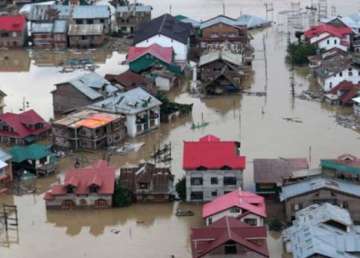Srinagar: The work of reconstruction in the flood-ravaged Kashmir could get delayed by at least six months due to the mass exodus of migrant labour force in the wake of the natural calamity that hit the valley causing huge damage to infrastructure -- both public as well as private.
Even the cleaning up of Srinagar city, which was heavily dependent on the migrant labourers for labour intensive works, will take longer than expected.
Although some migrant labourers are staying put in the valley, most of them -- commonly referred to as 'Bihari' labourers irrespective of which state they hail from – left Kashmir soon after flood waters started rose.
They took advantage of free air tickets announced by Prime Minister Narendra Modi for those leaving the valley on board the Indian Air Force planes bringing in relief material.
Thousands more left soon after the Srinagar-Jammu National Highway was made operational early in the week.
"It is difficult to find a labourer these days. It seems that all of them have vanished into thin air," Bashir Ahmad Dar, who needed a mason to carry out repairs in his house at Rambagh, said.
Before the flood hit Kashmir, the migrant labourers would assemble at designated places like Rambagh, Chanapora, Hyderpora, Hawal and Hari Singh High Street to wait for someone to hire their services.
The scene today at some of these places is totally different as many prospective employers are finding it hard to get someone to do the labour work for them.
"I have visited Rambagh, Hyderpora and Natipora sites but could not find even one labourer," Tanveer Ahmad Bhat said.
While most of the crops including horticulture produce has been damaged due to the floods already, people involved in infrastructure development fear that exodus of the migrant labourers will affect completion of many ongoing projects.
"Although most of the works are presently suspended due to engagement of every one with flood aftermath, resumption of development works will be largely dependent on the return of migrant workers to the valley," Ashfaq Ahmad Sheikh, a contractor, said.
He said it was unlikely that those labourers who have left Kashmir after the floods hit the valley will return this year.
"These labourers would generally leave the valley in the first week of November and return middle of March. I don't see them coming back any time soon," he added.
The shortage of labourers has resulted in nearly 30 to 50 per cent hike in the daily wages of skilled and unskilled labourers.
While skilled labourers have hiked their daily wage rates from Rs 400 to Rs 600, the unskilled labourers have increased it from Rs 330 per day to Rs 420 per day.
An estimated three lakh migrant labourers come to Kashmir to every year to earn a livelihood.
The early exodus of these labourers is also going to impact the local economy as many people, who had leased out their houses, would lose two months of earnings on account of rent.
Latest India News
